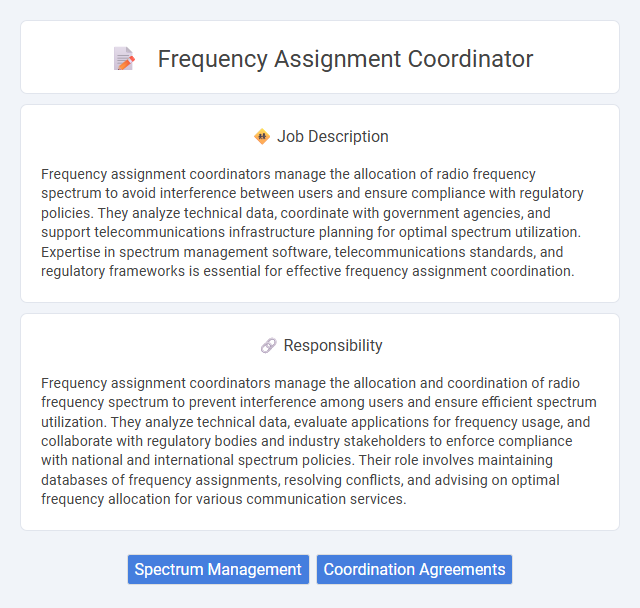
Frequency assignment coordinators manage the allocation of radio frequency spectrum to avoid interference between users and ensure compliance with regulatory policies. They analyze technical data, coordinate with government agencies, and support telecommunications infrastructure planning for optimal spectrum utilization. Expertise in spectrum management software, telecommunications standards, and regulatory frameworks is essential for effective frequency assignment coordination.
Individuals with strong analytical skills and attention to detail are likely well-suited for the Frequency Assignment Coordinator role, as it requires managing complex frequency allocation and interference issues. Those comfortable working in high-pressure environments and collaborating with regulatory bodies and technical teams may find this position a good fit. Candidates lacking technical knowledge or organizational skills might find the job challenging and less compatible with their strengths.
Qualification
Frequency assignment coordinators typically require a bachelor's degree in electrical engineering, telecommunications, or a related field, combined with a strong understanding of radio frequency spectrum management principles. Proficiency in frequency planning software, signal propagation, and regulatory compliance ensures effective spectrum allocation and interference resolution. Experience in coordinating with regulatory bodies such as the FCC and ITU enhances a candidate's capability to manage frequency assignments efficiently.
Responsibility
Frequency assignment coordinators manage the allocation and coordination of radio frequency spectrum to prevent interference among users and ensure efficient spectrum utilization. They analyze technical data, evaluate applications for frequency usage, and collaborate with regulatory bodies and industry stakeholders to enforce compliance with national and international spectrum policies. Their role involves maintaining databases of frequency assignments, resolving conflicts, and advising on optimal frequency allocation for various communication services.
Benefit
The role of a Frequency Assignment Coordinator likely offers significant benefits such as enhanced communication efficiency and reduced interference among wireless systems. Individuals in this position may gain valuable expertise in spectrum management, which is critical for supporting various industries including telecommunications and broadcasting. This job might also provide opportunities for collaborative work with regulatory bodies, increasing professional growth and networking potential.
Challenge
The Frequency Assignment Coordinator likely faces the challenge of managing complex spectrum allocations in increasingly crowded and dynamic electromagnetic environments. Balancing interference mitigation with regulatory compliance may require continuous analysis and rapid decision-making. Stakeholders' competing demands and evolving technologies probably add layers of difficulty to maintaining efficient and reliable communication channels.
Career Advancement
Frequency Assignment Coordinators manage spectrum allocation to ensure interference-free communications, playing a pivotal role in telecommunications and broadcasting industries. Expertise in regulatory compliance and signal propagation analysis opens pathways to senior technical roles, spectrum management leadership, or consulting positions. Advanced certifications and experience with international spectrum policies significantly enhance opportunities for career advancement and cross-industry mobility.
Key Terms
Spectrum Management
Frequency assignment coordinators play a critical role in spectrum management by allocating and coordinating radio frequencies to prevent interference and optimize usage. They analyze regulatory policies, coordinate with various stakeholders, and ensure compliance with national and international spectrum regulations. Their work supports seamless communication across industries such as telecommunications, broadcasting, and public safety.
Coordination Agreements
Frequency assignment coordinators manage and implement coordination agreements to prevent radio frequency interference between neighboring jurisdictions and operators. These professionals analyze and negotiate technical parameters to ensure efficient spectrum utilization and compliance with international and national regulations. Expertise in frequency planning and adherence to coordination protocols is critical for maintaining seamless communication networks and optimizing spectrum allocation.
 kuljobs.com
kuljobs.com